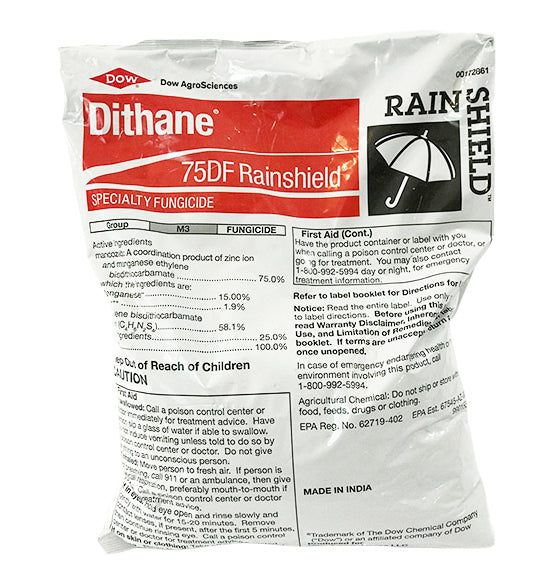Description
- Description
- Specs
- Labels and SDS Forms
Dithane 75DF Rainshield Specialty Fungicide is a broad-spectrum protectant fungicide that is effective in controlling plant diseases such as rust, scab, purple spot, copper spot, dollar spot, pythium blight, rhizoctonia brown patch, and other key diseases. This granular formulation uses Mancozeb as its active ingredient and it guarantees to provide superior rainfast protection to a wide variety of areas. Optimum disease control will be achieved when it is applied in a regularly scheduled preventive spray program. It can be used on field nurseries, greenhouse, sod farms, golf courses, industrial and commercial lawns and other similar non-residential areas.
Use Rate Determination:
- Carefully read, understand, and follow label use rates and restrictions.
- When two pesticides are tank mixed, the more restrictive label conditions apply.
- Do not tank mix with any product which contains a prohibition on tank mixing.
- Under low disease conditions, minimum label rates per application can be used while maximum label rates and the minimum interval may be used for severe or threatening disease conditions.
- For proper application, determine the number of sq ft to be treated, the required label use rate and the volume of spray mixture to be applied per 1000 square feet. Prepare only the amount of spray solution required to treat the measured area. Careful calibration of spray equipment is recommended prior to use.
- When preparing small quantities, 1 level tablespoon per gallon is equivalent to a 1 lb per 100 gallons of spray solution.
Mixing Procedures
Be sure sprayer is clean and not contaminated with other materials prior to use. When using an agitated spray tank fill tank 1/2 to 3/4 full with clean water and start agitation. Be certain that the agitation system is working properly and creates a rolling rippling on the liquid surface. With the agitator running, add the required amount of Dithane 75DF Rainshield to the tank. Continue filling tank with the remainder of the water.
When using a hand sprayer, premix Dithane 75DF as a slurry in a small container before adding to the spray tank. Slowly pour the appropriate amount of Dithane 75DF into a small container containing an equal volume of water while mixing. Mix until the Dithane 75DF is thoroughly wetted. Add additional water if necessary to make solution flowable. Add the contents of the slurry tank to a 1/2 filled sprayer, continue filling tank with remainder of water and mix well. Always add Dithane 75DF into solution prior to adding any additional materials to the tank.
Compatibility
Dithane 75DF is compatible with most commonly used fungicides, insecticides and growth regulators. When preparing tank mixes, user should consult spray compatibility charts or State Cooperative Extension Service Specialists prior to actual use.
Application:
Ground: Thorough coverage foliar sprays generally result in optimum disease control. To achieve good coverage use proper spray pressure, volume of spray mixture per acre, nozzles (generally hollow cone), disc (generally D-5 to D-7), nozzle spacing, and tractor speed. Consult spray nozzle and accessory catalogues for specific information on proper equipment calibration.
Hand Sprayers: Thoroughly spray plant foliage until runoff.
Aerial: A uniform initial spray deposit generally results in optimum disease control. Each aircraft should be prechecked for droplet size, uniformity of spray pattern, swath width, and spray volume. During aerial application, human flaggers are prohibited.
Nozzle selection: Hollow cone brass nozzles with a D-series orifice disc and core (whirlplate) are recommended. Nozzles should point straight down or slightly backward.
Swath width: For most crops, swaths just beyond the wingspan of 36 to 40 feet for light aircraft and up to 45 feet for heavier aircraft are suggested. Optimum swath for helicopters is usually 5 to 10 feet beyond normal boom length.
Spray volume: Aerial applications are to be made in a minimum of two (2) gallons of water per acre. On most crops, 2 to 3 gallons of spray per acre are generally optimum. Some tall or dense foliage crops requiring greater penetration to the lower leaf surface will require higher spray volumes. Do not use less than 5 gallons per acre in California.
Altitude: For most crops, the spray boom should be positioned in 5 to 10 feet above the crop canopy.
Flagging: Swaths should be marked at the end of the field with permanent. Swaths should be measured accurately with a chain or other device except when rows can be accurately counted.
* See label for complete list
| ACTIVE INGREDIENT | Mancozeb 75% |
| FOR USE IN | Field Nurseries, Greenhouses, Sod Farms, Golf Courses, Industrial and Commercial Lawns and other similar non-residential areas |
| APPLICATION | * See label for complete application instructions |
| MANUFACTURER | Corteva Agriscience |
| EPA REGISTRATION | 62719-402 |
| NOT FOR SALE TO | NY (Restricted To Licensed Applicators Only) |
Payment & Security
Your payment information is processed securely. We do not store credit card details nor have access to your credit card information.











